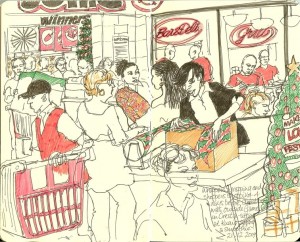Allen R. Dodd, Jr.’s The Job Hunter is the flip-side of “Mad Men”. This is what the world of 1960”²s advertisingof the white-collar workplace in generallooks like from the outside looking in. Subtitled “The Diary of a ‘Lost’ Year,” The Job Hunter began as an article in the 30 November 1962 issue Printer’s Inkat the time one of the leading trade journals of the advertising business. Although Dodd acknowledges in his introduction that his first-person narrator is “a composite figure, a typical white-collar job-seeker, created from a variety of sources,” he fully succeeds in creating a believable character from what could easily be a stereotype of one of John Cheever’s middle-aged train-catching commuters.
“It’s going to be tough on the company, of course, but the last thing in the world we’d want to do is to stand in your way,” Dodd’s nameless narrator is told one July afternoon by one of his higher-ups in a mid-sized ad firm. And so he is evicted from the world of the working and left to find another position, a process that takes him the better part of a year. Although many of the practical aspects of job-hunting have changedDodd’s narrator has little else besides the help wanted ads and a few business directories to go onThe Job Hunter is very effective in conveying the sense of being a social outcast that inevitably clings to a man without a job, particularly a white-collar professional.
Also from The Neglected Books Page:
In 1939, Rollo Walter Brown was 59, a former Harvard professor of literature, a popular lecturer, and a dangerous man. In I Travel by Train, he recalls some of his many trips across the United States through the depths of the Depression. His work as a lecturer on literature, politics, and history took him to all corners of the country, from San Francisco to New Orleans and Atlanta, from the industrial towns of Michigan and Ohio to the Dust Bowl of Oklahoma and north Texas. Wherever he went, he made a point of venturing out and trying to understand what was going on and why.
Check out the utterly charming drawings accompanying the I Travel by Train post. Graphic novels are not such a new concept, it turns out….
